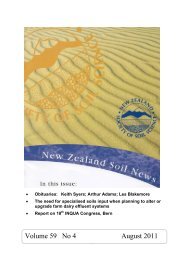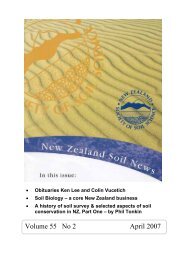Download - New Zealand Society of Soil Science
Download - New Zealand Society of Soil Science
Download - New Zealand Society of Soil Science
You also want an ePaper? Increase the reach of your titles
YUMPU automatically turns print PDFs into web optimized ePapers that Google loves.
etween agriculture and environment is an essential part <strong>of</strong> finding ways forward, for us now, and for<br />
the next generation <strong>of</strong> scientists and policy makers.‖<br />
Pro Vice-Chancellor <strong>of</strong> the College <strong>of</strong> <strong>Science</strong>s at Massey University Pr<strong>of</strong>essor Robert Anderson says<br />
that he is very pleased that Pr<strong>of</strong>essor Parsons elected Massey to be the host institution for the new<br />
Chair.<br />
―Massey is building its capability in the greenhouse gas emission arena and Pr<strong>of</strong>essor Parson‘s<br />
expertise is an invaluable addition.‖<br />
Pr<strong>of</strong>essor Anderson also said that AGMARDT is to be congratulated for taking this particular<br />
initiative, and he welcomed yet another co-appointment between Massey and AgResearch.<br />
Articles<br />
CarbonNet Report<br />
In August, soil carbon researchers met to formulate ideas around the re-establishment <strong>of</strong> a group to coordinate<br />
collaboration in response to climate change policy development. This meeting followed<br />
discussion at the SLURI <strong>Soil</strong> Carbon meeting convened by Alec Mackay in July. A late July<br />
teleconference <strong>of</strong> 18 researchers was organised by Alec (no mean feat!) and successfully drew up an<br />
agenda for action.<br />
University and CRI scientists elected a group <strong>of</strong> six to go forward to a second meeting where structure<br />
<strong>of</strong> the leadership group would be established. At the second meeting it was agreed that a widely<br />
representative leadership group would be most effective and we elected Frank Kelliher as Chair,<br />
Carolyn Hedley as Co-ordinator, and Tim Payn (Scion), Louis Schipper (University <strong>of</strong> Waikato), Troy<br />
Baisden (GNS) and Brent Clothier (Plant & Food) as a support committee.<br />
The CarbonNet logo was created by Troy Baisden and Darren D'Cruz at GNS <strong>Science</strong>, in consultation<br />
with the 6 member CarbonNet support group. The logo captures the role <strong>of</strong> soil in <strong>New</strong> <strong>Zealand</strong>'s<br />
productive and natural landscapes. The graphic conceptually depicts many <strong>of</strong> our prominent current<br />
land uses in colour and pattern. The koru (spiral) symbol represents the ever-evolving nature <strong>of</strong> land<br />
use.<br />
Our mission statement is:<br />
CarbonNet connects <strong>New</strong> <strong>Zealand</strong>‟s soil carbon research community. CarbonNet provides<br />
expert knowledge and advice on the role <strong>of</strong> soil carbon processes and inventories to government<br />
and other parties interested in climate change mitigation.<br />
We aim to act as a conduit for soil carbon research to climate change policy development. With the<br />
Copenhagen meeting in December and uncertainties around a national policy for soil carbon<br />
accounting, we recognise policy issues can be as challenging as the science. From this perspective,<br />
our inception seemed timely. The Copenhagen meeting will be a first meeting <strong>of</strong> UNFCCC parties<br />
with an agenda to discuss a new international protocol to address global climate change beyond the<br />
Kyoto Protocol commitment period that ends 2012. Representatives <strong>of</strong> 170 countries, including <strong>New</strong><br />
<strong>Zealand</strong>, are expected to attend this meeting. Another relevant, recent development in <strong>New</strong> <strong>Zealand</strong> is<br />
the upcoming virtual Centre for Agricultural Greenhouse Gas Emissions Research, with an emphasis<br />
on mitigation. This government initiative will be established early in 2010.<br />
At the risk <strong>of</strong> impertinence, we will not recount here a list <strong>of</strong> current, soil carbon research projects and<br />
programmes that are potentially relevant to policy development. Rather we will try to convey<br />
stakeholder perspectives communicated to us at our inaugural meeting on 24 September in Wellington.<br />
Stakeholders challenged us to consider soil carbon accounting from their points <strong>of</strong> view and basically<br />
asked: how can research contribute?<br />
162










